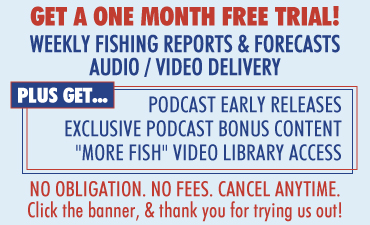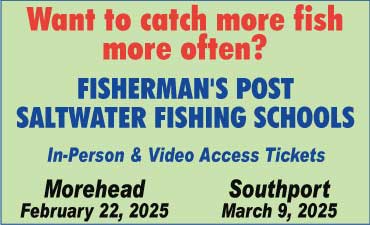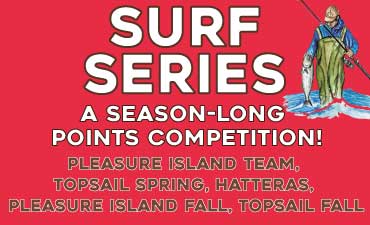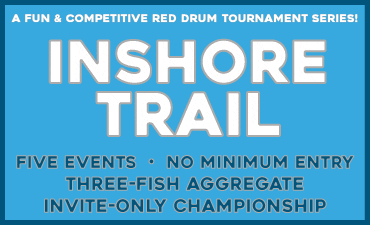Releases – April 9, 2015
The newly formed North Carolina Guides Association (NCGA) is pleased to announce the creation of an official 501(c)(6) industry trade association, developed to represent the interests of for-hire fishing captains invested in the sustainable management and conservation of North Carolina’s state-managed fisheries.
At a recent meeting in Surf City, NC, the NCGA convened to elect leadership and formalize its mission statement. The NCGA was founded by an experienced group of captains, representing a range of independent small businesses that provide recreational anglers with access to the State’s marine fishery resources.
The NCGA’s diverse membership includes inshore, nearshore, and offshore for-hire guides, from throughout North Carolina’s coastal counties. Members are held to a high professional standard and are required to hold an active NC for-hire license, all necessary credentials, and commercial liability insurance.
North Carolina’s charter and guided fishing industry is a valuable year-round contributor to the coastal economy, and is also integral to a thriving tourism industry in many of the state’s small coastal towns. “As small business owners, we bring tremendous value to North Carolina’s coastal towns and cities by attracting serious anglers from in and out of state,” said NCGA Vice President Capt. Jeff Cronk “Our businesses depend on providing the public with access to healthy fisheries and abundant fishing opportunities. We want to ensure that there is a bright future for the for-hire guide industry.”
The NCGA will work with its membership to represent the interests of the for-hire guide industry, and support informed involvement in the state’s public decision-making and fisheries management processes.
“We commend the North Carolina Division of Marine Fisheries (NCDMF) for maintaining an open dialogue and working relationship with other official industry trade associations,” said NCGA president Capt. Tom Roller. “Our members look forward to working productively with the NCDMF and the North Carolina Marine Fisheries Commission to support a sustainable future for North Carolina’s state-managed fisheries and the for-hire guide industry.”
For more information please contact our officers: Capt. Tom Roller, President, capttom@waterdogguideservice.com; Capt. Jeff Cronk, Vice President, jcronk@ec.rr.com; and Capt. Mike Pedersen, Secretary/Treasurer, mike@noexcusescharters.com.
The prices of six commercial fishing licenses will go up 60 percent for the 2015-2016 license year, for which sales begin April 15.
Fees will go up for the Standard Commercial Fishing License, Retired Standard Commercial Fishing License, Shellfish License, Land and Sell License, Fish Dealer License, and Recreational Commercial Gear License.
The Commercial Vessel Registration fee will not go up this year.
The new fees represent a 100 percent increase from two years ago under a plan to fund the N.C. Division of Marine Fisheries Observer Program that was proposed by the commercial fishing industry.
Money from the increased fees will go into a Commercial Fishing Resource Fund to pay for observer coverage to fulfill the state’s obligations under incidental take permits for the commercial fishing industry under the federal Endangered Species Act. Additional money from the fund will be used for other projects to develop and support sustainable commercial fishing in the state.
Spending from the fund must be approved by both the Marine Fisheries Commission and the Funding Committee, made up of commercial fishing representatives.
The observer program collects at-sea information about commercial and recreational catches by observing fishing, either onboard fishermen’s vessels or from a division vessel operated in the vicinity of fishing activity. Observer coverage is a requirement of the state’s Sea Turtle Incidental Take Permit and Atlantic Sturgeon Incidental Take Permit for the gill net fisheries. Without this coverage, the state’s gill net fisheries must close.
In 2013, the N.C. legislature appropriated $1.1 million for the Observer Program for fiscal year 2013-2014, and approved a 25-percent increase in commercial fishing license fees beginning in fiscal year 2014-2015 to fund the program in the future. The legislature instructed the division to seek public input and develop a plan for additional funding for the program.
In February 2014, Jerry Schill, executive director of the N.C. Fisheries Association, presented a proposal to the N.C. Marine Fisheries Commission to establish a Commercial Fishing Resource Fund to receive revenues from a 100-percent increase in fees for six commercial fishing licenses. The 100-percent increase was based on fiscal year 2013-2014 license fees.
The commission endorsed the plan, as did the Division of Marine Fisheries and the N.C. Department of Environment and Natural Resources. The fee increases were approved by the N.C. General Assembly for the upcoming fiscal year.
For more information, contact Don Hesselman, License and Statistics Section chief, at (252) 808-8099 or Don.Hesselman@ncdner.gov.
The N.C. Marine Fisheries commission is seeking three to five recreational fishermen to provide input to the commission’s Coastal Recreational Fishing License Grant Committee.
At least one of the advisers will be from the recreational for-hire industry.
The advisers will meet with the committee, which typically meets two to three times a year to develop a request for proposals, review proposals, and select which grants to fund.
The advisers will be appointed by the Marine Fisheries Commission chairman to serve for three-year terms. They will be reimbursed for travel mileage and meals associated with the meetings.
To be qualified to serve as an adviser, applicants may not have had a significant fisheries violation within the past three years.
Adviser applications are available online at http://portal.ncdenr.org/web/mf/mfc-advisory-committees, at N.C. Division of Marine Fisheries’ offices or by calling (252) 808-8021 or (800) 682-2632. Applications should be returned by May 1 to the Division of Marine Fisheries, P.O. Box 769, Morehead City, NC 28557, Attention: Nancy Fish.
The 2015 budget act, reports the NC Camo Coalition, contained a provision giving the Division of Marine Fisheries (DMF) authority to enter into a Joint Enforcement Agreement (JEA) with the National Marine Fisheries Service (NMFS) to provide support for enforcement of federal fishing laws and rules in North Carolina’s jurisdictional waters by our Marine Patrol. Currently, very limited enforcement of these rules takes place in these offshore waters. This scarcity of enforcement has a serious negative impact on marine fisheries in North Carolina waters. Millions of North Carolinians depend upon a healthy, robust fishery resource for their livelihood and enjoyment.
Expanded enforcement authority and action that will come with JEA are important, as is the supplemental federal funding, which should amount to about $600,000 per year. Our Marine Patrol is underfunded and understaffed for the important job they are called upon to perform, which is essential for the welfare of the State. These new funds can put fuel in their patrol boats, which are sitting idle now. North Carolina is the only coastal state that has not taken advantage of a joint state federal agreement to improve enforcement of marine fisheries laws and rules. No state has ever failed to renew the agreement because the benefits are obvious and significant. The only people who would have reason to oppose stronger enforcement of our fisheries laws are those who would violate them.
The budget act was signed by the Governor on August 7, 2014, but no action has taken place to initiate implementation of the JEA. Immediate action is needed to ensure that North Carolina has the JEA by next federal fiscal year which begins October 1, 2015. If North Carolina has not started implementation with NMFS by April 15, 2015, we will have to miss yet another year in this important program.
The Marine Fisheries Commission emphasized the importance of the JEA most recently at their August 2014 meeting and encouraged immediate action by a 6-2 vote. Now is the time to take positive action to help our marine fisheries by initiating consultation with NMFS to enter into the JEA for next year.
The reason for delay is not clear. We are calling upon fishermen and conservationists concerned for strong law enforcement to protect our marine fisheries to contact the Governor and request him to move in a positive fashion to authorize implementation of the Joint Enforcement Agreement with NMFS before April 15, 2015, so that North Carolina can begin participating in this proven financial benefit on October 1, 2015.
You can read an editorial about the JEA written by Tim Gestwicki, CEO, NCWF, and published in the Raleigh News and Observer in March.
NC Camo Coalition is a project of the NC Wildlife Federation.
NOAA Fisheries is implementing management measures in Amendment 32 to the Fishery Management Plan for the Snapper-Grouper Fishery of the South Atlantic Region (Amendment 32). The final rule publishes in the Federal Register, and is effective, on March 30, 2015.
Amendment 32 contains management measures that end overfishing (rate of fish removal too high) of blueline tilefish in the South Atlantic. A population assessment completed in 2013 determined that blueline tilefish is undergoing overfishing. The South Atlantic Fishery Management Council and NOAA Fisheries are required by law to prepare and implement a plan amendment and regulations to end overfishing by December 6, 2015.
Note that recreational harvest of blueline tilefish is scheduled to begin on May 1, 2015. However, the recreational sector will not open in 2015 if recreational landings have reached, or are projected to reach, the recreational annual catch limit. In addition, the commercial sector will close in 2015 when commercial landings reach, or are projected to reach, the commercial annual catch limit.
Amendment 32 contains the following management measures:
Blueline Tilefish: (1) For 2015, annual catch limits of 17,841 and 17,791 pounds whole weight for the commercial and recreational sectors, respectively. The annual catch limits would increase each year as the stock rebuilds; the 2018 values would be held constant until changed through future rulemaking; (2) A commercial trip limit of 100 pounds gutted weight; (3) A recreational vessel limit of one per vessel per day for the months of May through August each year. Recreational harvest would be prohibited September through April each year; (4) Accountability measures for the commercial and recreational sectors. Accountability measures are management controls to prevent annual catch limits from being exceeded and to correct overages of the catch limits if they do occur; and (5) A recreational annual catch target.
Deep-Water Complex: (1) Removal of blueline tilefish from the deep-water complex. The deep-water complex currently includes blueline tilefish, yellowedge grouper, silk snapper, misty grouper, queen snapper, sand tilefish, black snapper, and blackfin snapper; (2) Recalculation of the commercial and recreational annual catch limits; and (3) Revisions to the accountability measures for the commercial and recreational sectors.
More information, including Amendment 32 and the Frequently Asked Questions, can be found online at http://sero.nmfs.noaa.gov/sustainable_fisheries/s_atl/sg/2014/am32/index.html.





